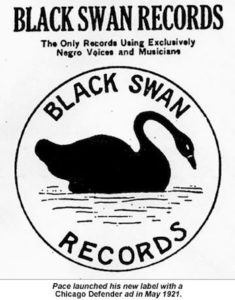
Black Swan Logo
*On this date in 1921, we celebrate Black Swan Records, America's first Black-owned record label.
In March of 1921, under the laws of the state of Delaware and using about $30,000 in borrowed capital, Harry Herbert Pace organized the Pace Phonograph Corporation, Inc. The company’s first office was his home on West 138th Street, New York. Pace did not have an easy time entering the record business. When he attempted to use a local pressing company, white record companies threw up obstacles to keep him out. A predominantly white company purchased the plant and would not do business with him. He got a local studio to record but had to send the master to a pressing plant in Port Washington, Wisconsin.
Finally, he began manufacturing Black Swan Records after about six weeks with all the preliminary work and all the necessary ingredients in place, recording laboratories, wrapping paper, and corrugated board. The name Black Swan was used to honor the talents of Elizabeth Taylor Greenfield, a remarkable Negro singer known as "The Black Swan." Pace designed the logo. In advertising with the African American press, Pace stressed the race issue, saying, "The only genuine colored records, others are only passing for colored." Among the earliest employees was Fletcher Henderson, the label's pianist and bandleader, who became the recording manager, and William Grant Still, the classical composer and orchestra leader, the new firm’s musical director.
The first three releases, probably recorded in April of 1921 and issued in May, featured C. Carroll Clarke, from Denver, a baritone known to sing ballads and with a good reputation among high-class Negro patrons; Katie Crippen, a vaudevillian who sang Blues; and Revella Hughes, a soprano and vocal teacher who was very popular among the highbrow New York area clients. Other regularly used musicians during that period included: Joe Smith, Cornet; George Brashear, Trombone; Edgar Campbell, Clarinet; Cordy Williams, Charlie Dixon, Banjo; and "Chink" Johnson, Trombone/Tubas. William Grant Still played several instruments: Oboe, Violin, Cello, Clarinet, Saxophone, Banjo, and others.
Black Swan’s early releases were straight songs or novelty numbers; their blues selections had not been made in the blues style. This changed in the summer of their first year when Ethel Waters came to the company's rescue. The success of Black Swan’s "Down Home Blues," sung by Waters, led to the formation of the Black Swan Troubadours, a group led by Henderson and Waters that toured the South promoting the label; hence, the company was doing better by the fall of 1921. The successes experienced by the tour alerted the competition in the market. Unfortunately, at the time of this success, Black Swan got a break to record and sign Bessie Smith, who would later become a legend as the "Queen of the Blues." Upon hearing her sing one night, Pace decided she was too "nitty-gritty" for his taste.
Two years later, she would shatter all sales as a Columbia recording artist. More than ever, in 1922 and 1923, obtaining Black artists became increasingly harder as the major white companies began to bid competitively for their services. After Black Swan’s Vaudeville tour concluded in July of 1922, artists like Fletcher Henderson and Ethel Waters no longer recorded exclusively for the label. The success of race records led to costly competition and price-cutting by white-owned labels such as Okeh, Paramount, and Columbia.
Many Blacks from the entertainment community resented Pace and Black Swan. This was for breaking his promise of an all-Black recording company, though he continued advertising otherwise. It was proven that the company was pressing records that used music by white ensembles, such as the Original Memphis Five. Pace began to lose the respect and confidence of the musician community, and it became more challenging to continue to produce a quality product.
In March 1923, the Pace Phonograph Company was renamed the Black Swan Phonograph Co., signaling trouble was coming. By the summer, no new recordings of Black Swan were announced. Black Swan Records concluded operations in 1924.
To become a sound and video producer.